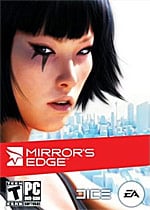Mirror’s Edge Brings Fresh Gameplay, Makes Red Cool Again
Electronic Arts has been busy developing the PC version of last year’s Mirror’s Edge, which released on the Xbox 360 and Playstation 3 last November. Since then, PC gamers have been highly anticipating this title and all that it promised to bring. Now that it has finally arrived, however, does it make good on its appeal?
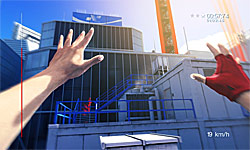
First, it is important to mention that Mirror’s Edge isn’t a standard FPS game. Its focus isn’t on combat, but rather avoiding it. Faith, the player-controlled, female protagonist is a “runner,” a type of fugitive that delivers packages by running across rooftops and through narrow corridors while avoiding law enforcement. It’s the future, and the government has gone to great lengths to install sophisticated security in the city. There are cameras everywhere and just about every movement is monitored. The result is a clean, sterile, and nearly crime-free city, but it is designated by many as not being worth the sacrifice. This is where the runners come into play.
The whole “Big Brother” thing isn’t exactly novel, but it fits well in Mirror’s Edge because the story doesn’t really attempt to remedy the looming issue of security vs. freedom. Instead, it takes a much more personal route through Faith and her relationships. It is also refreshing to see a female lead character that wasn’t modeled to be the next Lara Croft. Instead, Faith exhibits a lot of strong qualities, but without folding completely to male-driven stereotypes.
The story is told using both in-game cutscenes and short, animated cinematics that are interesting and stylized. The cinematics occur after each completed mission, and from a plot standpoint, do a good job of keeping things interesting for the player. While a lot of games tend to use the standard in-game cutscenes or advanced computer-generated images for their storytelling, it is nice to see some alternative thinking to that approach. And, in many ways, using animation can be much more effective.
The PC version of Mirror’s Edge appears to be just as polished, if not more so, than its console counterparts. With a patch released just after its release, the PC version definitely plays a bit smoother. A lot of frustration with controls doesn’t seem to be much of a problem on the PC. The keyboard/mouse configuration works perfectly with the difficult wall running and double-jumps that it takes to survive.
Impressively, Mirror’s Edge’s control customization is simple and straight-forward. Considering the number and level of complexity of moves and combos that can be performed, the list of controls is actually shorter than most standard FPS games. Not only does this make it easy to remember how to do things, but executing those moves becomes second nature. For a game that could easily require a long list of controls, Mirror’s Edge’s simplicity in this area should be applauded.
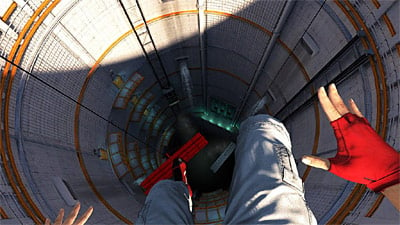
Visually, Mirror’s Edge delivers great things on the PC. It is able to pull off the next-generation visuals well despite the vast cityscapes and outdoor areas that require rendering. And, both the in-game renders and animated cutscenes are uniquely vibrant and bold with color, which is a nice change in the recent trend for “visually realistic” games to be lost in seas of browns, greens, and grays. There are occasions when things seem a bit too bright, but it isn’t particularly annoying.
The interiors are just as sterile and empty as the exteriors, but this has more to do with the story and style. One issue that can be had, however, is the lack of people. With all the running and the amount of distance traveled, Faith barely sees another person. This seems odd considering how many buildings she will barrel her way through during the game. It would have been interesting to see how population densities could affect the gameplay, particularly when running through busy office buildings. Instead, all the buildings appear to be devoid of all life. Nevertheless, whether you’re jumping between rooftops, tip-toeing across pips, or scaling the interior of a five-story building, the visuals never seem to disappoint, despite being a little empty.
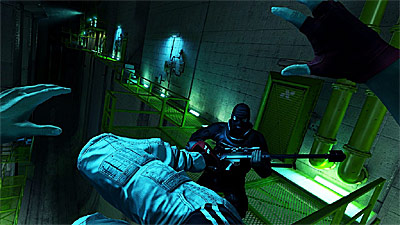
If the visuals weren’t good enough, the music, sound effects, and voice acting put Mirror’s Edge on the map. With soothing ambient soundtracks for the running done between combat encounters and the heart-pounding, fast-paced tracks for when things get intense, the music is always on point and does what music should do in video games: make an impression and increase immersion.
Because of the first-person perspective, the sound effects need to be just as in sync with the music and visuals, and Mirror’s Edge doesn’t disappoint here either. Heavy breathing, varying footsteps, grunts, stumbles, bullet ricochets, and the cracks of hand-to-hand combat are all captured and delivered flawlessly. There is never a moment when the player isn’t aware of Faith or what she is experiencing.
The voice acting isn’t as good as the music or sound effects, but they are definitely above average for a video game. Some characters come across as a little cheesy or over-the-top, but how much of that is because of style or design choice is unknown. On the other hand, what is known is that the voice acting does complement the story well.
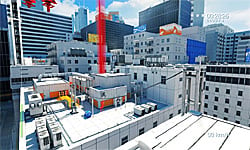
Mirror’s Edge can be a frustrating game, especially when a single misstep or problematic glitch occurs and forces the player to respawn at a much earlier part of the level. Even with the red “runner vision” that helps guide the player through the levels, falling to your death is inevitable. Luckily, the game does have invisible checkpoints that keep the player from restarting at the beginning of the level. Keep in mind, the difficulty level of Mirror’s Edge isn’t really a problem of game design. The game does have varying difficulty levels to make things easier or harder. There is even an option to take away the “runner vision,” which removes the red-highlighted guides.
While the game does recommend that players avoid direct confrontations with enemies, there are instances where they are unavoidable. This is when the player must use quick thinking on the best way to disarm and overcome enemies. Whether it’s attempting to disarm from behind, or lure them away from groups first, or just tripping them so getting away is possible, the player is given very little time to make choices. Ultimately, it really depends on the player’s preference. A room full of enemies could be cleared by killing them all one at a time, or by simply escaping with a few well-timed jumps.
If combat is a player preference, however, it isn’t an easy one to manage. Faith, unlike most FPS protagonists, isn’t bullet proof. In fact, a single bullet (two at the most) can put her down easily. Moreover, a single pistol whip can put her into a daze or cause her to stumble, while an additional one or two could put her down for the count. Player skill is a huge factor when determining success or failure in combat. While Faith doesn’t carry a gun, she does have the ability to pick them up and use them. However, she also is unable to perform a lot of her more complicated moves while carrying one. Generally, the bigger the gun, the less she can manage.
Another interesting aspect of the combat is the amount of ammunition. When an opponent with a pistol has been disarmed, Faith gets the handgun and only the bullets that remain in the magazine. This seems logical, but most FPS games tend to miss the mark in this area. Instead, they carry on the misconception that a single pistol on the ground comes with a full magazine of ammunition as well as a ton of extra. In Mirror’s Edge, however, once the player has fired the last shot, Faith instinctively throws the weapon aside. While this seems like such a minute detail, it does a great job of reinforcing running as the main gameplay element while also providing just another, often over-looked, bit of realism.
Once player’s have finished the single-player story, there is additional gameplay to be had by competing against other players in time trial leader boards. Unfortunately, racing against another or multiplayer opponents at once isn’t a feature of this “multiplayer” component. This is where Mirror’s Edge could use the most improvement. With such solid and interesting gameplay, a multiplayer experience that took advantage of the gameplay to its fullest would have done nothing short of increased its overall value.
Mirror’s Edge is a delightful tangent from the traditional gameplay elements that keep much of the FPS genre stagnant. The addition of a female protagonist is refreshing, even if the grander story arc doesn’t exactly break new ground. The game does suffer a bit from technical issues here and there, but not nearly enough to make it not worth the effort. If anything, the only problem with Mirror’s Edge is its relatively short story, which is only increased by the lack of a multiplayer component that does its gameplay justice. Nevertheless, Mirror’s Edge is a solid and innovative title that takes the FPS genre and reminds it that things don’t always need to stay the same.
RATING OUT OF 5 RATING DESCRIPTION 4.5 Graphics
A vibrant and colorful game that isn’t afraid to take some artistic and stylized routes via animation. 4.0 Control
Standard and simplified FPS controls make performing the most complex combination of acrobatic moves as simple and fluid as they should be. 4.5 Music / Sound FX / Voice Acting
Top quality music, pervasive and realistic sound effects, and decent voice acting go a long way in increasing the level of immersion. 3.8 Play Value
Refreshingly unique gameplay coupled with an interesting and personal narrative are only hindered by the game’s relatively short single-player experience and lacking “multiplayer” component. 4.0 Overall Rating – Great
Not an average. See Rating legend above for a final score breakdown.
Game Features:
